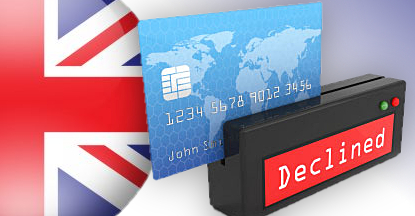 Major payment processors have voluntarily agreed to block financial transactions between UK punters and online gambling sites not licensed by the UK Gambling Commission. The agreement, signed by Visa Europe, Mastercard and PayPal, was made public during Tuesday’s debate in the House of Lords over the Gambling (Licensing & Advertising) Bill, which will require all UK-facing companies to hold a UK-issued license if they wish to market their wares to UK customers.
Major payment processors have voluntarily agreed to block financial transactions between UK punters and online gambling sites not licensed by the UK Gambling Commission. The agreement, signed by Visa Europe, Mastercard and PayPal, was made public during Tuesday’s debate in the House of Lords over the Gambling (Licensing & Advertising) Bill, which will require all UK-facing companies to hold a UK-issued license if they wish to market their wares to UK customers.
The Lords failed to approve a measure that would have empowered the government to enforce such financial blocking, but the aforementioned companies have voluntarily agreed not to process credit card transactions between UK punters and sites not bearing the UK Gambling Commission’s stamp of approval. The payment firms will begin blocking such transactions once the government’s point of consumption tax (POCT) kicks in this December. Sites that flout these restrictions could face the possibility of Visa et al withdrawing payment support.
Financial blocking was one of the measures considered by the government to enforce its new Bill, along with IP-blocking of sites not holding a UK license, but British internet service providers have stated that they won’t IP-block any sites without a court order.
ONLINE BOOKIES TO BE HIT BY HORSE LEVY
The Lords also convinced the government to introduce an amendment to the Bill that would require all UK-facing companies to contribute to the much-loathed horseracing Levy. In October, the Department of Media, Culture and Sport that oversees gambling had stated that the government didn’t intend to use the Bill to alter the Levy and a previous attempt to introduce such an amendment at the House of Lords committee stage was unsuccessful, but government minister Lord Gardiner has now promised to introduce the amendment at the Bill’s Third Reading in the Lords on March 18. Gardiner said the amendment would give the government “power to use secondary legislation to secure levy extension to offshore remote operators.”
The Levy currently applies only to land-based bookies in the UK, but under the proposed amendment, UK-facing online operations based in jurisdictions like Gibraltar and Alderney would also be required to ante up roughly 10% of gross profits on racing wagers to the Horserace Betting Levy Board (HBLB). Such a plan would require a sniff check by the European Commission for any whiff of illegal state aid, but the EC approved a similar system in France last summer.
If approved, the amendment would likely cost UK-facing online bookmakers a combined £20m on an annual basis. Already facing a significant hit via the 15% POCT, bookies could be excused for feeling like the government is piling on. In 2012, betting exchange Betfair struck a five-year deal to contribute 10.75% of racing profits to the HBLB, while William Hill, Ladbrokes, Coral and Betfred agreed to a voluntary four-year, £18m contribution with the HBLB in October, on top of their combined annual Levy contribution of not less than £47.5m. The HBLB estimates the total contribution from bookies will hit £80.2m in 2014/15.
